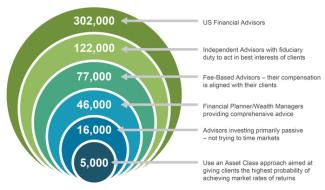
All Financial Advisors Are Not The Same. What Type of Advisor Do You Have?
Let's start with a pretty straightforward question: With more than 300,000 financial advisors in America, why is it so hard to find good advice?
This question has been a hotly discussed issue for as long as I've been in the financial services industry. I remember when I got into the business well over a decade ago, I was shocked to find out that there were different standards of care for clients and that all "financial advisors" were not held to the same standard of behavior and expectations. Most recently a Department of Labor initiative that began under the Obama Administration to attempt and address some of these inconsistencies in client treatment was delayed by the Trump Administration. It was originally set to go into effect this month.
Think about these 2 stats from Envestnet's Compendum of Industry Trends, April 2015,... First, 60% of advisors aren’t required to act in their clients’ best interests. And 70% still try to beat the market, even if few are ever consistently successful.
When I started my own practice, I remember I wanted to be a different kind of advisor. My goal was to provide the consistent, caring, comprehensive and knowledgeable advice that i believe investors need and deserve. In today's mix bag of behavior in our industry that makes me a rarity but it also makes it easy for me to do something that many advisors struggle with – differentiating myself in a crowded marketplace.
Here are some of the reasons why I'm different….
Of the 302,000 financial advisors in America, according to Envestnet's figures, only about 122,000 are Independent Advisors with a fiduciary duty to their clients. These advisors are not required to sell any particular products or services to satisfy a sales goal or company mandate. And as fiduciaries they must put their client first and act at all times in the best interests of each client. This is important because financial advice should never be compromised. (Note: This might be a good place to make a note to ask your advisor a bit more about his client responsibilities...where they begin and where they end).
But many independent advisors are still selling commission-based products, which can lead to conflicts of interest, even if unintended. Envestnet's presentation indicated only about 77,000 independent advisors are primarily Fee-Based or Fee-Only, meaning they receive the majority of their compensation from client fees. They are paid for advice, not for the sale of a financial product (except for some products such as life insurance or long-term care policies) and they prosper only as their clients prosper.
Of the 77,000 fee-based/fee-only advisors, about 46,000 are Financial Planners/Wealth Managers — defined by Envestnet to mean they take a holistic, comprehensive planning approach and address a full range of financial needs beyond investment management, including tax management, retirement income planning, estate planning, etc.
Of these advisors, about 16,000 usually invest primarily in Passive Investment Vehicles — they don’t spend time and client money trying to beat the market (an almost insurmountable challenge as studies consistently suggest). And they don’t recommend expensive, complicated products. However, we know that there are still some drawbacks to many passive products — such as index funds and ETFs — including lack of internal trading flexibility and imprecision.
Finally, the Envestnet presentation indicated that only about 5,000 advisors (less than 2% of the total) follow an Asset Class Investing approach, based on decades of data, analysis and research, insights from behavioral finance and close relationships with leading academics. But what makes these advisors special is that they don’t follow fads or relegate their clients’ futures to guesswork and speculation. Instead they embrace exposure to the factors of return and the long-term growth potential of markets around the world.
I am proud to be a part of the minority of advisors in my industry. Its also a good feeling to be a part of an elite group of advisors as I am with the Integrated Financial Group Consortium, based in Atlanta, that share my perspective on client treatment. As a partner with this group, I am reminded everyday of how we are professional as individual advisors and as a group.
As I wind up this post, I want to be clear. Just because there are advisors out there getting paid in various ways and having different business models, that doesn't make them bad people. I have many friends in the industry that are compensated in ways that are different from me. They are good, hard-working and honest folks.
But the issue that I have with our industry is that most people who rely on us to assist them simply aren't fully informed on how "advisors" that share the same title can be very, very different in terms of compensation and accountability. Transparency in areas of fees and responsibility should be improved. I believe it falls to us as leaders in our profession to educate and inform and allow our clients to make informed decisions on what and who they want.
Investing in index funds and ETFs involves risk, including loss of principal.

